|
|
|
Sort Order |
|
|
|
Items / Page
|
|
|
|
|
|
|
| Srl | Item |
| 1 |
ID:
168861
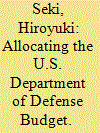

|
|
|
|
|
| Summary/Abstract |
This article examines the ‘incremental/fair share model’ that was proposed by Alex Mintz in 1988 concerning the budget allocation of the U.S. Department of Defense. Although Mintz was unable to confirm the correctness of his model, this study demonstrated it to be statistically significant. In the statistical analyses, I used the two-stage least squares method and Durbin’s h-test to better scrutinize the model’s adequacy. Few previous studies have addressed the allocation of the U.S. defence budget; consequently, the incremental/fair-share model should constitute a starting point for further research on the U.S. defence budget allocation.
|
|
|
|
|
|
|
|
|
|
|
|
|
|
|
|
| 2 |
ID:
079647


|
|
|
|
|
| Publication |
2007.
|
| Summary/Abstract |
An ever-growing share of defence R&D expenditures is being dedicated to the development and fielding of integrative technologies that enable separate individual systems to work in a coordinated and synergistic fashion as a single system. This study explores the optimal defence budget allocation to the development and acquisition of weapon systems and to the development of integrative technologies. We develop a suitable optimization framework, and then use it to derive the optimal budget allocation and analyse its properties. Finally, we use US defence budget data to calibrate the parameters of the model and provide a quantitative measure for the apparent US military supremacy.
|
|
|
|
|
|
|
|
|
|
|
|
|
|
|
|
| 3 |
ID:
131327
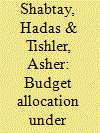

|
|
|
|
|
| Publication |
2014.
|
| Summary/Abstract |
This study presents a framework and models for the analysis of government budget allocation into defense and civilian expenditures in situations of uncertainty about the incidence of war. The models display the intricate relationships between security levels, subjective probabilities of the occurrence of war, and potential war damages. We show that poor countries tend to perceive greater probabilities of war than their richer rivals, and that the psychological burden of insecurity is larger when the country's wealth is larger and when its preference for security is higher. We apply our models to the Israeli-Syrian arms race and show that the higher rate of growth of Israel's gross domestic product relative to that of Syria is expected to lead to an increase in Syria's perception of the likelihood of war and to a decrease in Israel's perception of such a likelihood. We also show that if Syria's regime becomes ideologically more extreme, the monetary cost of maintaining Israel's security at the level that it enjoyed prior to the change will be very high, whereas the monetary cost of maintaining Israel's welfare will be moderate.
|
|
|
|
|
|
|
|
|
|
|
|
|
|
|
|
| 4 |
ID:
153068
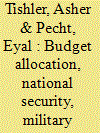

|
|
|
|
|
| Summary/Abstract |
This study develops a dynamic model that integrates military intelligence into the defense capability of the country and the optimal allocation of its government budget. We assert that the effectiveness of the country’s military intelligence is contingent on the quality of its human capital, which, in turn, implies a long-term positive relationship between the government’s various civilian expenditures and its capacity to achieve a cost-effective intelligence and, hence, military capability. This relationship is developed within a multiple-period arms race model between two rivals. Using this model and stylized data for the Israeli–Syrian arms race, we show that an appropriate budget shift from defense to civilian expenditures during the initial periods of the planning horizon will gradually (over a decade, say) increase the quality of human capital in the country and, thus, the effectiveness of its intelligence, which, in turn, will increase the country’s future security and welfare.
|
|
|
|
|
|
|
|
|
|
|
|
|
|
|
|
| 5 |
ID:
191964
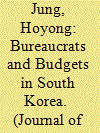

|
|
|
|
|
| Summary/Abstract |
This article presents evidence that high-ranking public officials in the Ministry of Strategy and Finance in South Korea affect local budget allocation. Applying a regression model on a uniquely constructed panel dataset, I found that the growth rate of the per-capita National Subsidy, which is a subcomponent of the national budget susceptible to discretionary behaviors, increases approximately 7 percent in the hometowns of high-ranking bureaucrats. To validate these findings and address causality, I conducted a battery of auxiliary robustness checks, which yielded confirmatory results. This study also found that enhancing transparency in the budget allocation system can alleviate concerns about bureaucratic hometown favoritism, providing suggestive evidence of bureaucrats’ rent-seeking behaviors without government transparency.
|
|
|
|
|
|
|
|
|
|
|
|
|
|
|
|
| 6 |
ID:
165780
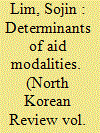

|
|
|
| 7 |
ID:
175352
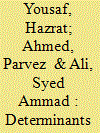

|
|
|
|
|
| Summary/Abstract |
Per capita availability of water is a serious challenge for Pakistan, like other countries. The objectives of this study are to investigate the different sources of water supply use by Pakistan’s urban households, their willingness to pay and modelling the determinants of the households’ budget allocation for water consumption. The study employed Pakistan Social and Living Standards Measurement (PSLM) 2015–2016 data set, which revealed that more than 60 per cent of households rely on piped water. The result of the variable filtration plant shows that urban households take less care of their health because the tendency of filtered water use is low. The regression result shows negative effect of per capita income, and positive effect of square of per capita income reflects that measures to accelerate income will help to increase budget allocation for water supply at the households’ level. The findings call for accelerating the water filtration plants, water availability in tap and higher incomes while controlling the population size and shared common washroom can help to save water in the case of urban Pakistan.
|
|
|
|
|
|
|
|
|
|
|
|
|
|
|
|
| 8 |
ID:
171006


|
|
|
|
|
| Summary/Abstract |
This study evaluates the relationship between a country’s human capital and its capacity to achieve, over time, effective national security. We show that an increase in the importance that a country attributes to its future, and/or in the effectiveness of its education system, leads to a decline in its current civilian services but to increases in its future human capital, civilian services, national security, and social welfare. Data for the Israeli-Iranian arms race confirm our predictions and show that a predilection for short-term political or personal gains impedes investment in human capital and inhibits future economic growth, national security and social welfare.
|
|
|
|
|
|
|
|
|
|
|
|
|
|
|
|
| 9 |
ID:
177824
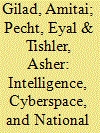

|
|
|
|
|
| Summary/Abstract |
This study evaluates military intelligence as the process of data collection and knowledge development and assessment for decision-making by the military and other governmental agencies. We argue that dominance in modern warfare is enabled by human and technological intelligence that uncovers the rivals’ capabilities and intentions, increases the effectiveness of the country’s own weapon systems, and facilitates the development of high-quality defense systems. Hence, gathering and evaluating intelligence is essential for countries involved in conflict or exposed to terror threats. We focus here on the strategic and tactical implications of intelligence in the context of an arms and intelligence race between two rivals. We present and assess models that show how security agencies in countries in a state of conflict (with other countries and/or non-country entities) should invest in developing their own intelligence capabilities to ensure adequate military (security) capabilities, national security, and welfare. Since advanced cyber attackers can infiltrate almost all complex computer networks to gather intelligence (and/or cause other harms), we show how countries can establish procedures and determine the budgets to optimally allocate cyber-defense resources to prevent harmful cyber-attacks on the complex computer networks that manage their infrastructure, business, security, and government operations.
|
|
|
|
|
|
|
|
|
|
|
|
|
|
|
|
|
|
|
|
|